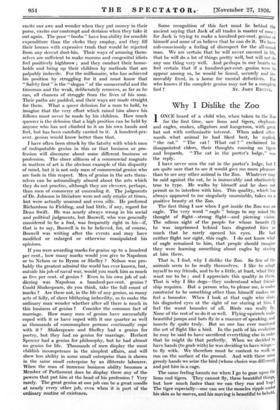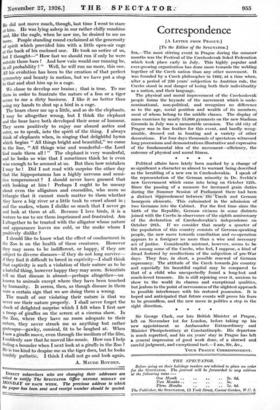Why I Dislike the Zoo
ONCE heard of a child who, when taken to the Zoo A- for the first time, saw lions and tigers, elephants and eagles, snakes, alligators and kangeroos, with great but not, with enthusiastic interest. When asked after. wards what animal he had liked best, he replied. " the cat." ".The cat ! What cat ? " exclaimed his disappointed elders, their thoughts running on tigers and leopards: " The cat in the porter's . lodge," was the reply.
I have never seen the cat in the porter's lodge, but I am quite sure that to see it would give me more pleasure than to see any other animal in the Zoo. Whatever may be said against. the cat, he is immovably and obstinately true . to type. He walks by himself and he does not permit us to interfere with him. This quality, which has always appeared to me singularly unamiable, takes on a positive beauty at the Zoo.
The first thing I saw when- I got inside the Zoo was an eagle. The very word " eagle " brings to my mind the thought of . flight—strong flightand piercing vision. The odious sight - of the people for whose benefit (?) he was imprisoned behind bars disgusted him so much that he rarely opened his eyes. • He had neither flight nor sight, this eagle. I do not know what of eagle remained to him, that people should imagine they were learning something about eagles by staring at him there.
That is, I find, why I dislike the Zoo. So few of the animals seem to be really themselves. I like to adapt myself to my friends, and- to be a little,' at least; what they want me -to be ; and I appreciate this quality in them. That is why I like dogs—they understand what friend- ship requires. But a person who, to please me, is under constraint to be something other than himself makes me feel a bounder. When I look at that eagle who shuts his disgusted eyes at the sight of me staring at him, I feel the worst bounder of all. Birds can really fly. None of the rest of us do it so well. Flying squirrels make beautiful jumps and bats fly in a manner of speaking, and insects fly quite truly. • But no one has ever mastered the art of flight like a bird. In the path of his evolution he may be said to have sacrificed everything else in order that he might do :that perfectly. When we decided to have hands (to grab with) he was deciding to have wings— to fly with. We therefore must be content to walk or run on the surface of the ground. And with these same greedy hands we seize the bird (whose choice was different) and put him in a cage.
The same feeling haunts me when I go to gaze upon the lions and tigers. They cannot fly, these beautiful things, but how much faster than we can they run and leap! The tiger especially—one can see the muscles ripple under his skin as he moves, and his moving is beautiful to behold. ge did not move much, though, last time I went to stare at him. He was lying asleep in our rather chilly sunshine and, like the eagle, when he saw me, he desired to see no more. People standing round exclaimed at the generosity of spirit which provided him with a little open-air cage at the back of his enclosed one. He took no notice of us, but I thought—" How fast we should run if only he were outside those bars ! And how vain would our running be, in all probability ! " Well, he will run no more, this one. All his evolution has been to the creation of that perfect symmetry and beauty in motion, but we have put a stop to that and shut him up in a cage.
We chose to develop our brains ; that is true. To use them in order to frustrate the nature of a lion or a tiger seems to me a dirty business. I like it no better than using my hands to shut up a bird in a cage.
The bears cheer me up a little, and so do the elephants. I may be altogether wrong, but I think the elephant and the bear have both developed their sense of humour. They seem positively to enjoy our absurd antics and enter, so to speak, into the spirit of the thing. I always think of elephants when, in singing that delightful hymn which begins " All things bright and beautiful," we come to the line, 5 All things wise and wonderful—the Lord God made them all ! " The elephant is very wonderful, and he looks so wise that I sometimes think he is even wise enough to be amused at us. But then how mistaken I may be ! Did I not read with surprise the other day that the hippopotamus has a highly nervous and sensi- tive temperament ? I should never have guessed that with looking at him ! Perhaps I ought to be uneasy about even the alligators and crocodiles, who seem so lethargic that it cannot much matter to them whether they have a big river or a little tank to crawl about in ; and the snakes, whom I dislike so much that I never go and look at them at all. Because love birds, it is a torture to me to see them imprisoned and frustrated. Am I altogether to be trusted with the alligator whose nature and appearance leaves me cold, or the snake whom I positively dislike ?
I should like to know what the effect of confinement iii the Zoo is on the health of these creatures. However they may seem to be indifferent, or happy, if they are subject to diverse diseases—if they do not long survive— if they find it difficult to breed in captivity—I shall think that captivity is such a violation of their nature as to be a hateful thing, however happy they may seem. Scientists tell us that disease is almost—perhaps altogether—un known to animals except where they have been touched by humanity. It seems, then, as though disease in them were a certain sign that we are doing them a wrong.
The result of our violating their nature is that we never see their nature properly. I shall never forget the shock of delighted surprise which I felt when I first saw a troop of giraffes on the screen at a cinema show. In the Zoo, where they have no room adequate to their nature, they never struck me as anything but rather gratesque--gawky, comical, fit to be laughed at. When I saw a giraffe move, even through the medium of the film, I suddenly saw that he moved like music. How can I help feeling a bounder when I next look at a giraffe in the Zoo ? Ile is too kind to despise me as the tiger does, but he looks terribly pathetic. I think I shall not go and look again.
A. MAUDE ROYDEN.



















































 Previous page
Previous page